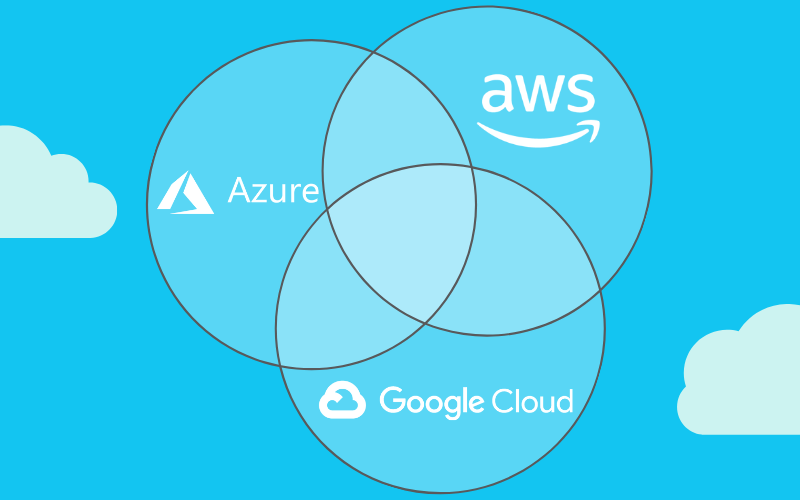
AWS vs. Azure vs. Google Cloud - Cloud Wars 2019
Companies are increasingly aware of the advantages of migrating their servers to the cloud.
The cloud has become a resource that offers optimization of operating costs, reduces risks offering the possibility of lower initial investment, provides access flexibility, and the efficient use of resources.
The offer of cloud services in the digital world is wide, and in most cases, it can be difficult to decide which type is ideal for organizational use.
In the majority of the occasions, companies look for a solution to: create infrastructures, develop modern applications, obtain information from data, or manage identities. To do this, they often issue an assessment among the following contenders: Amazon Web Services (AWS), Microsoft Azure, and Google Cloud Platform.
Previously it was necessary to carry out a reflection of the migration process and its implications for your company in particular through the following steps:
- Analyze internal processes and assess business needs.
- What will be the exact use of the cloud?
- What applications or workloads do you want to take to the cloud?
- What are your security requirements?
- What to choose between private cloud and public cloud?
Study how new technology will adapt to your business
- What are the implications for your current IT team?
- Are your licenses and software compatible with the cloud?
In what state is the data you must migrate to the cloud?
Determine the conditions of partnership with the provider
- How will the interaction with the provider be?
- How long will it take to migrate?
- How will the plans and prices be established?
- What will be the level of portability to change the environment?
With our answers, we can already consider a comparative study of the available options. In our case, we will focus on the industry leaders, the three titans with resources to make their services in the cloud robust and expandable: Windows Azure, Amazon Web Services (AWS) and Google Cloud Platform.
AWS Cloud vs. Azure Cloud vs. Google Cloud
We can distinguish three large areas in this type of environment.
- Infrastructure as a service (IaaS): In IaaS, the service provider provides the infrastructure, such as network resources, storage, or computation. The client manages its own software on top of the provider's hardware, usually including the operating system and up.
- Platform as a service (PaaS): In PaaS, the service provider provides the infrastructure and an application development platform that generally includes the operating system, database, and web server. Customers manage their own applications.
- Software as a service (SaaS): SaaS refers to a distribution platform that hosts apps. A service provider manages the hosting makes it available to subscribers.
Microsoft Azure
It offers easy integration with other Microsoft tools, competitive packages, and security guarantees with multi-cloud back-up.
Possibly the most important added value offered by Microsoft is the close relationship with its customers. For decades it has marketed its services on the corporate front allowing them to offer packages of attractive services, confidence guarantee, and ease of acceptance among employees.
In a survey, 64% of Azure users said that the trigger for their decision was their previous relationship with Microsoft. Moreover, much of Microsoft's advantage lies in its ability to integrate its platform with other Microsoft products that are well established within companies in a global environment.
For example, an IT team that has invested time and resources in Office 365 or the Hyper-V platform will surely consider Azure as a natural extension of its current operations.
Azure is the only platform in the cloud that Gartner has qualified as a leader in the sector for infrastructure as a service (IaaS) and platform as a service (PaaS). The effective combination of managed and unmanaged services allows you to create, deploy, and manage applications to obtain high levels of productivity.
Azure does not limit consumers to Windows products, in fact, it offers Windows, Linux or BSD machines at prices that compete with Linux, includes most open source technologies as well as a variety of tools owned by third parties and supports any operating system, language, tools, and framework, be it Windows, Linux, SQL Server, Oracle, C # or Java.
There is the possibility of combining a data center and the public cloud, what Microsoft calls a hybrid. A passport to the best of both worlds, being able to expand IT options without added complexity. Data storage, back-up, and recovery are efficient and economical. It is also easy to create applications that cover both the local infrastructure and the cloud.
Azure can be expanded or reduced quickly to adapt to any demand. This is its popular 'pay per use.' There is a billing per-minute option, and Microsoft also commits to matching the prices of the competition for the known infrastructure services, such as process, storage, and bandwidth. In addition, all the information stored in Azure can be exported to other environments without any restriction.
It runs in a global network of data centers managed by Microsoft in 19 regions.
Amazon Web Services (AWS)
It is easy to use, large scale and innovative.
Amazon Web Services offers a set of global services for computing, storage, databases, analysis, applications, and implementations.
Like Azure, AWS also offers facilities in the mobility of Microsoft licenses. However, the process is more complicated and tedious since several forms have to be filled in, waiting for validation by Microsoft. Furthermore, mobility does not include 100% of the licenses available in the market.
Like Microsoft, Amazon bases its billing method on a pay-per-use system without the need to make a large initial investment. Your plans can be expanded or reduced quickly to suit any demand.
AWS offers immense capacity in its services in the cloud. Gartner estimates that it would have approximately five times more capacity than the combination of its 14 immediate competitors. As well as Azure, AWS has a network of multiple independent data centers located in more than ten countries.
In addition, AWS integrates external network providers that work directly with your cloud, offers competitive products for databases, analytics, and data through a product made up of blocks that the user organizes at your convenience.
AWS offers a scalable product at astronomical levels quickly and quite intuitively.
Amazon invests continuously in the development of innovations in the market of 'cloud computing' such as its latest tools: DynamoDB NoSQL database and the most recent announcement Lambda.
Lambda is a computer service which is responsible for executing code in response to different events and manages the resources of the computer automatically by the user. It facilitates the creation of applications that respond quickly to new information.
Google Cloud Platform
It offers enhanced safety at a lower price.
One of the most attractive products of this platform for the business mobile application development teams is called App Engine. It allows creating applications in an agile way without having to deal with the server. Likewise, with Google Cloud, you can run a high level of computing, storage, networks, and databases. It does not have much services to offer than its competitors, yet it's pretty useful for mobile application development projects.
Google is sufficiently familiar with enterprise-level security, so its customers can certainly depend on its protected services. It has maximum security with data encryption, authentication levels, and third-party verifications.
Google Cloud Platform doesn't offer as many features. It is still very cost-effective. It offers a payment system in the form of a billing "per second" use. Apart from that, customers can expect discounts in the long-term.
If you have decided to migrate part or all of your business to the cloud, invest time and resources in a thorough analysis of your company's needs. The offer of services in the cloud is very varied and adapts to diverse business profiles.
Got Questions?
Our experts can comprehensively guide you in this regard, whether you're seeking information on both cloud services or looking to seek Azure certification or AWS certification to boost your career prospects.
